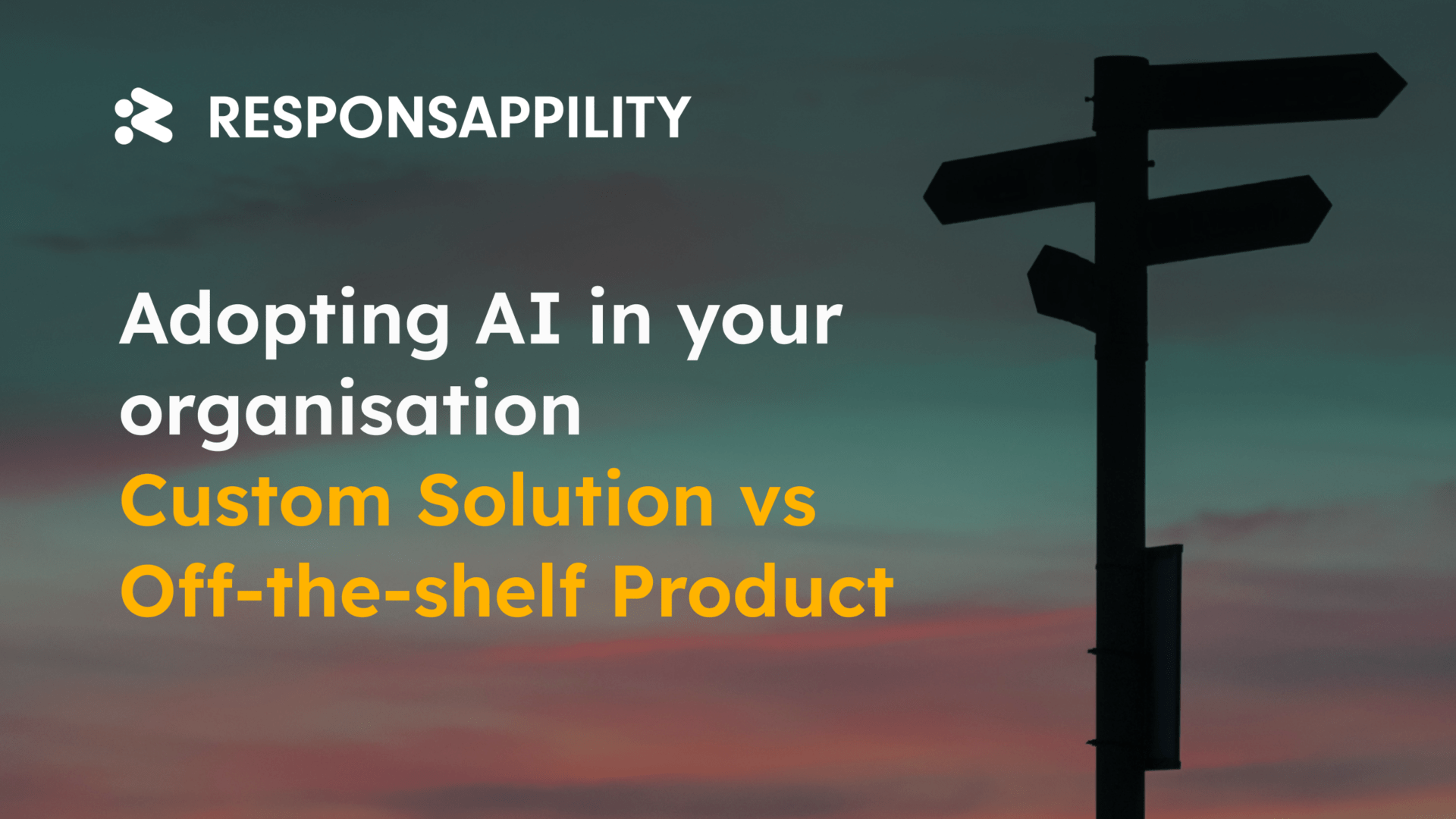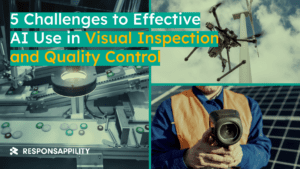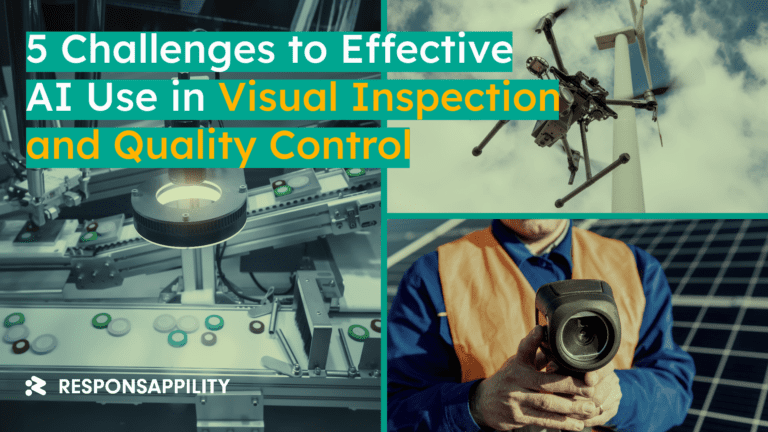There is more and more AI around us. In companies, the use of AI solutions is becoming increasingly popular and bringing more and more benefits. The question then arises — how to effectively adopt AI in an organisation? Should you select an off-the-shelf solution, or should you invest in one created for you and tailored to your case?
The growing popularity of AI solutions
Creating effective AI solutions is a significant challenge, with a lot of uncertainty and success depending on many factors. All this is why so many initiatives to use machine learning fail. Of course, some projects will fail, such is the nature of risky research work.
Nonetheless, many failures can be avoided by correctly approaching the problem and the entire research procedure. Here you can find a brief presentation about starting the AI projects created by Responsappility.
These pitfalls show the importance of the right approach to your AI ideas.
Options? Custom AI solution or off-the-shelf product
When you decide to support your processes or extend the functionality of your product with AI, and you want to avoid maintaining in-house AI competence in the long term, you are left with two options:
- Outsource the research and development of a solution to a company that will make an AI tailored to your needs.
- Use off-the-shelf AI solutions in various forms (cloud AI services, self-hosted apps, SDK).
So, what to choose and when? When to lean towards one option or the other?
Custom AI solutions — when it’s worth considering?
1. A specific problem to solve or working conditions
A specific problem you want to solve, a nuanced process you intend to improve, or a particular product functionality you wish to add. All of these cases require customisation are situations where a tailored approach makes perfect sense. Examples: defect detection analysis of a specific type of object, data fusion solutions, and video analysis for health and safety.
It is a common situation where a task to solve is quite generic, but the working conditions of AI are unusual and specific to your organisation. For example, detecting forklifts on a video stream, but with strange camera angles, specific lighting conditions, and many distractors around them.
Such circumstances indicate that it is worth considering developing a tailored, dedicated solution. Otherwise, the quality of the AI model’s performance can be severely disappointing.
2. You have data that is worth using
Do you have data, or can you collect or acquire it? It is well worth making use of it. Data is a precious resource when it comes to AI modelling. Often, their quality determines the final effectiveness of the solution. You can tailor the solution to your specific requirements if you have good data. Using it in a custom solution lets you gain an advantage.
3. You need model performance quality
You can expect a significantly better performance quality when the task for AI is well-defined, you have valuable data, and you decide to prepare a solution fully tailored to your requirements. It’s especially true if the problem characteristics or working conditions are unusual.
A tailored, effective AI model can bring a competitive advantage that is hard to eliminate. The off-the-shelf solutions are much easier to implement by competitors. So if you are looking for a key differentiator, go for a tailored AI solution.
4. You want to improve and further develop the solution
Preparing the first production version of an AI solution is one thing, but maintaining it in its life cycle may require much more work than most people think. Working conditions, data, and the task to solve change gradually over time and the AI model is getting outdated (it’s called ‘drift’). The implemented solution needs to be monitored, periodically refreshed or augmented. If you want the solution to serve you for a long time, you need to be able to maintain and enhance it in the future (whether in-house by outsourcing it).
5. You want to keep the intellectual property rights
Intellectual property rights are an issue worth considering. You can obtain exclusive rights for its IP by opting for a custom solution. IP lets you control further development and gives you a market advantage, making it more difficult for competitors to implement similar functionality.
6. You are ready to pay for the benefits it gives
What about the costs? Undoubtedly, the entry threshold is higher for custom solutions. However, when considering it in the long term, it can pay off through economies of scale, competitive advantages, effectiveness, and the value of IP.
It is worth looking at a custom solution as a long-term investment with the potential to scale up.
When do off-the-shelf AI products fit best?
1. The problem you want to address is generic and has many solutions
When the problem you wish to solve is universal and broadly addressed. Moreover, when the working conditions for AI are typical. And when the little chance of beating the competitors with AI quality. It is a common example where an off-the-shelf solution can work effectively and be sufficient and cost-effective. Examples? Number plate recognition, barcode scanning or speech recognition.
2. You have no access to valuable data sets that can be used to train the AI
You don’t have the data, and you don’t have any possibility to acquire it, but you wish for certain AI functionality? Without data, you lose one of the fundamental advantages you can leverage. Using an off-the-shelf solution may require you to redefine the problem and work below your expectations, but it may be the only option if you want such AI functionality.
If the planned functionality of your product that uses AI is insignificant and not intended to be an advantage, it is worth opting for simpler approaches. Especially if you care less about performance quality, IP rights and further development are not crucial. In such cases, the off-the-shelf solution will do the job.
3. You have a lower budget, and you are ready for trade-offs
The costs of an off-the-shelf solution are usually lower. But you will not have the IP, and developing or customising the solution might be impossible.
However, there are many business cases for which this is unimportant, and a low entry threshold is essential. If it’s going to be just a minor additional functionality of your product, you can go for the off-the-shelf solution and be satisfied.
So, what is the verdict?
For key functionalities, specific conditions, and long-term plans and when the IP rights and performance matter — custom AI project outsourcing
For minor features, popular and solved AI tasks, and when you have a lower budget — off-the-shelf AI products.
Custom AI solutions and off-the-shelf AI products are options worth considering. However, there is no one clear answer. It all depends on the business case, its context, and the company’s strategy.
Wisely balancing an organisation’s solution portfolio and aptly choosing which functionality should be custom and which can be the off-the-shelf AI product is the key to successfully adopting AI in your company.







